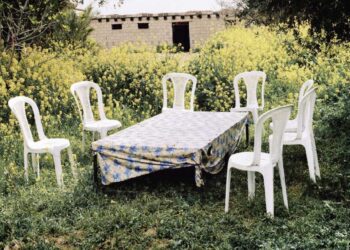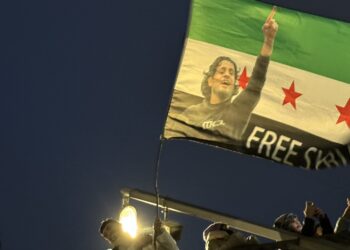Issam Hani Hajjaj is a 27 year-old poet and author living with his parents and five siblings in the Gaza strip. He was born there and was never able to leave. Since October, Issam has been writing a public diary about everyday life in the war zone on his blog called “Witness from Gaza“. For almost eight months now, the news has been full of military attacks, political negotiations and rising death tolls. But what does it mean on an individual level to live through this war? How do the events feel for a young person like Issam?
Issam and I have been writing to each other via WhatsApp since the beginning of April. There and on his blog, he describes how his life has changed since 7 October 2023.
The first thing Issam does when he wakes up in the morning is to mentally scan himself: “Am I still alive? Is my body intact?” He then gets up and makes his way to the toilet, a five-minute walk away. From there, he goes to the hospital to check on his parents. He wakes them up and brings his father breakfast and medication. If necessary, he goes to the market looking to get as much food as possible for his family for as little money as possible.
Wherever he goes, Issam talks to people and listens to their stories.
When I was on my way back from Rafah to the European Hospital yesterday, the bus driver didn’t want to listen to the news. He decided to put on some music. He was in a joking mood, lit a cigarette and said that this was exactly how he wanted to die: ‘I don’t care about anything, because I’m happy with the life I’ve lived. The bus was like a magic lamp that took us out of the atmosphere of death and threw us back to a time when we went on short trips with our friends and fought over who got to turn on the first song.
Blog entry from 20 December 2023.
Biting cold and hunger
On 7 October 2023, Hamas broke through the Israeli wall around Gaza in several locations. They took more than 200 hostages from military outposts and villages along the border. Around 1200 people were killed that day of which around 700 civilians. Since then, the Israeli army has been hitting back with full force in Gaza killing over 36,000 people including over 15,000 children and wounding over 81,000 with numbers expected to be far higher due to the complete collapse of the medical system and the siege imposed by Israel severely restricting access to basic humanitarian aid, water, electricity, and food. In the Gaza Strip, which has been occupied by Israel since 1967, the supply situation has long been very poor. But now an increasing proportion of the population is suffering from hunger. Medical care has almost completely collapsed and 85 percent of people have lost their homes.
Issam is one of them. His family comes from Shuja’iya, a neighborhood in the east of Gaza City. However, Issam currently lives in Al-Fukhari in the Khan Younis governorate. The homes of his family and most of his relatives were destroyed by Israeli air strikes at the end of October. He and his siblings are currently housed in a school, where they spend the night in a classroom with other people – 14 people in one room.
I feel reasonably well, no headache, no bloodshot eyes. Yesterday, for the first time, my whole body was lying on a mattress. Some days I slept on the floor. On others, half my body was on the floor, the other half on a mattress. The cold is biting, as if it wants to take revenge on us. It’s not just the cold that bites people, but also the hunger. There is almost nothing left in the stores. The other day I wanted to buy tinned beans and cheese, but it was all gone.
Blog entry from 8 November 2023.
He writes to express his feelings, Issam explains to me in a WhatsApp message in April. “So that our voice as Palestinians is heard and our story doesn’t die”. “We love life but are being killed,” he wants to tell the world. Issam writes in the crowded classroom in the evening, when the voices and noises finally quiet down. He writes on his cell phone when he visits his father in hospital, or sitting on the curb outside the hospital. He lost his laptop when the family home was destroyed, along with all his texts from the last few years. Sometimes writing feels like cheating reality, he says, “Our feelings are far too big for words – only screams would do them justice.”
Buried under the house
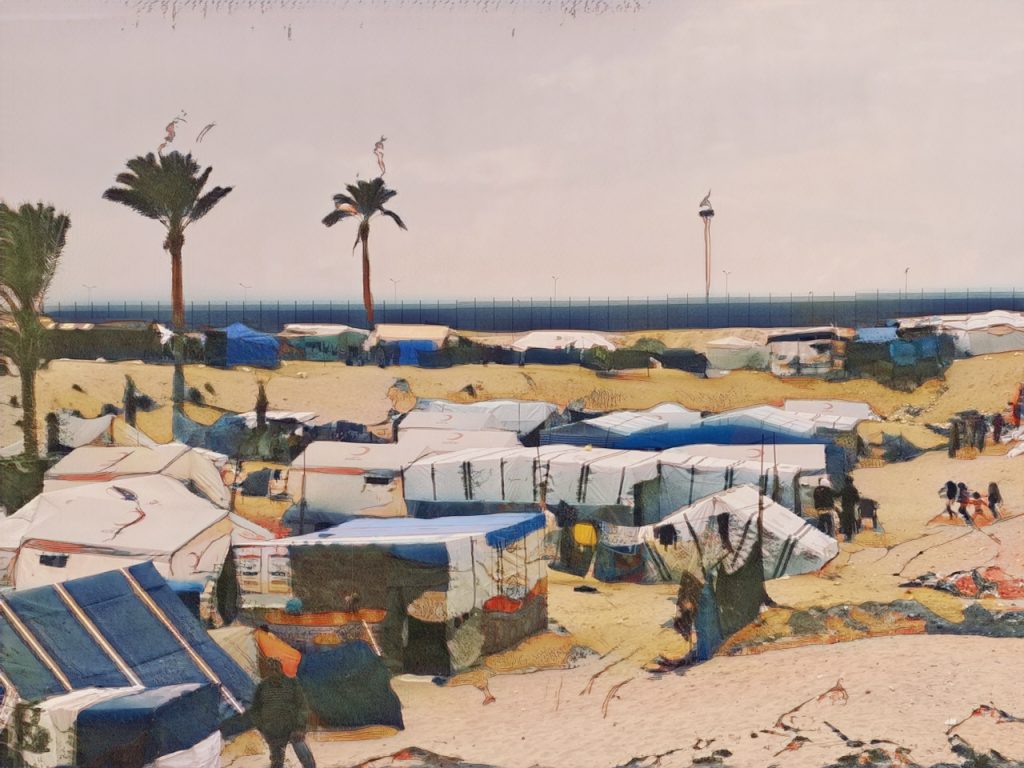
On the night of 27 October 2023, the Israeli army began its ground offensive in northern Gaza. It surrounded Gaza City and called on the population to leave to the South. In preparation, the Israeli army bombed what it called “terrorist targets belonging to the Hamas terrorist organization in Shuja’iya and throughout the Gaza Strip”. Issam was still living in Shuja’iya at the time.
Friday 27. 10. 6.15 pm Gaza time: While talking and chatting in my aunt’s house, we were suddenly all buried under it. Without warning, the Israeli occupation bombed the house above our heads. I was on the phone with my uncle Adham in Berlin. One moment I was sitting on a chair on the roof with my family, the next I found myself under the rubble. It felt like I had been burned alive, tons of smoke in my mouth.
Blog entry from 29 October 2023.
After regaining consciousness, Issam searched for his loved ones. His siblings, mother, aunt, cousins: “Everyone was there except my father. We started digging and calling for him until he answered us.” The family cleared the rubble with their bare hands. Despite the threat of a second air raid, they agreed that they would not leave without him.
Three days later, Issam recalls the minutes after the impact.
I wish I had cried like everyone else. I wish I had thrown out my tears – all my emotions locked up in my chest, the screaming of my siblings, the look on my sister’s face when she asked the first responder to help us dig out my father. My mother’s screams as she feared for his life. The shock in her eyes, the trembling of her hands, the touches we exchanged to find some comfort. Oh, how I wish I had screamed as loud as I could until I forgot who I was.
Blog entry from 30 October 2023.
After they finally managed to free the father, they took him to Al-Shifa Hospital, which is now completely destroyed. There he had to lie on the floor for several hours until someone had time to stitch up his head wound. The next day, he was transferred to the European Hospital in Khan Younis. Diagnosis: fractures in his arm and foot, bleeding and injuries in both eyes, impending blindness. Since then, the family has been in an even more acute emergency: they have to bring the father from Gaza to Egypt so that he can get the operations he needs before he loses his sight completely.
Sunday, November 19, 2023: One must know the opposite of a state in order to find balance in life. To know rest, one must experience exhaustion. To know calm, one has to come out of chaos. Our days in the European Hospital are difficult to describe. So many wounded and dead souls have been admitted in the last few days. To get some distance, I decided to go somewhere where I wouldn’t have to talk to anyone. I looked at the faces of passers-by – their activities, their movements and their silence – and meditated. I looked at the sunset and was able to breathe more freely. It felt like I had a soul again.
Blog entry from 19 November 2023.
Fall asleep crying, wake up crying
When the house buried Issam and his family, his uncle Adham heard their screams in Berlin, almost 3000 kilometers away. Then the connection was severed. A moment ago he was on the phone with his nephew Issam. Now he didn’t know whether he and the other relatives were still alive. “Shortly afterwards, footage from the Al-Shifa hospital was shown on al-Jazeera. I saw my sister with her little son in her arms,” recalls the 38-year-old during a meeting in Berlin six months later. He only found out exactly what had happened the next morning. The night before, the whole of Gaza had been cut off from the internet.
Adham has been living in Germany for almost twenty years. He sends money to the family in Gaza every month. “But no matter how much you send, it’s as if you send nothing,” says Adham, because food is becoming more and more expensive. “A kilo of tomatoes, for example, costs ten euros,” he explains. He has no choice but to fear for his family’s lives from afar. Sometimes he goes to demonstrations and reads out a few lines from Issam’s texts. The solidarity of the people gives him some hope. But on other days, he says, he falls asleep at night crying and wakes up in the morning crying.
Adham and Issam are close. “I was always the cool uncle,” says Adham smiling. When he visited his family in Gaza, most recently a year ago, he and Issam would sit on the roof and talk until dawn. Adham says he has always found him to be sensitive. “Where we come from, you’re not expected to show any emotion. But he’s different: a calm guy with a calm voice, open, understanding.” Issam is considerate of people and their feelings, knows and takes care of many people, Adham explains. “I’ve always admired him for his character,” he adds. Even now, Issam is always out and about: “Many people are depressed and have no energy to go out. Issam has the strength to look after people, listen to their stories and write them down.”
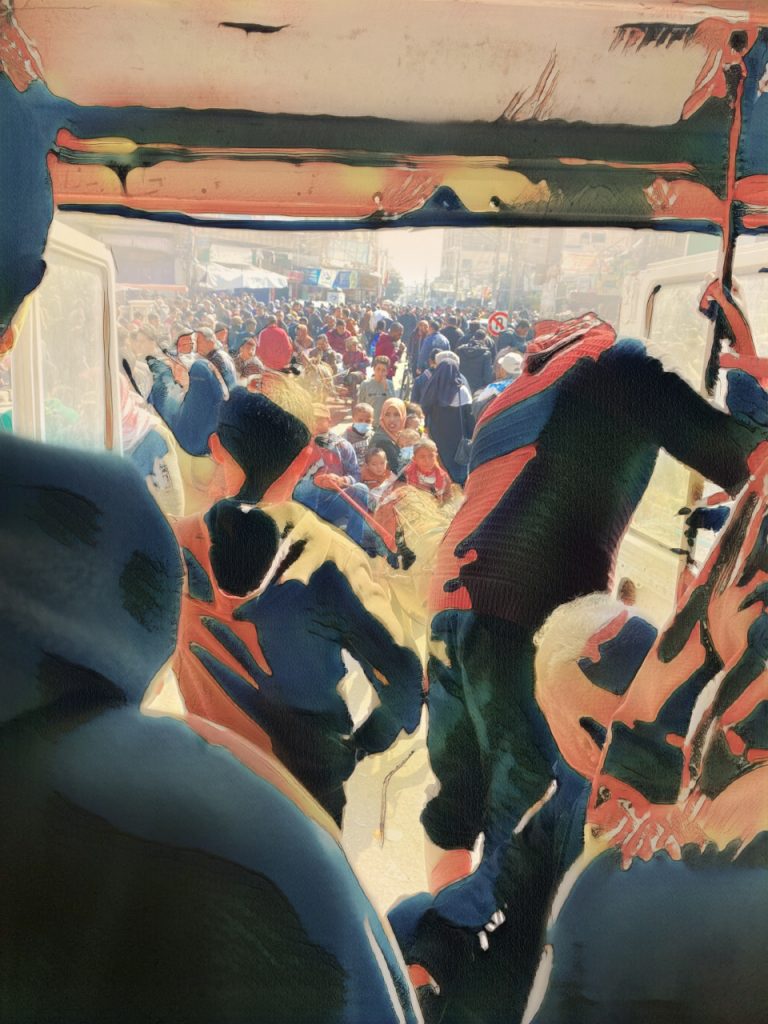
Before the war, Issam was a teacher. He taught children creative writing. He was also a co-founder of the “House of Wisdom” group in Gaza City, which met regularly to discuss the influence of stories on the development of individuals and societies. They drew on the concept of “Mujaawarah” by Palestinian professor Munir Fasheh. The term translates as something like “neighbouring”, and the idea behind it is to come together as a group without authority from inside or outside, to read, discuss and learn together. The focus is on exchange, community and self-reflection. This way of thinking also protects him now, Issam writes to me. “It helps me to get back to my core and remember who I am.”
Like butterflies
Friday 12.04.2024: A five-minute phone call with my aunt Nadia, who still lives in the north of the Gaza Strip. I’ve been trying to call her for three days. ‘Hello? This is Issam. ‘Why haven’t you come to see me, my boy?’ she says in a cheerful voice that comforts me. I laugh and say, ‘I’m already on my way.’ My aunt Nadia is a gentle woman, her features are like butterflies. Everyone blossoms around her. I usually visit her on Eid, but this time we are far apart. She’s in the North and I’m in the South. The occupation separates us with a barrier in the middle, with planes above us and hundreds of soldiers around us. Her strong voice has filled me with strength. It is because of her that I am writing now.
Blog entry from 12 April 2024.
Almost eight months have passed since the Hamas attack, eight months of death and destruction in Gaza. Five percent of the population is dead or injured and around two thirds of the buildings have been destroyed. Israeli Prime Minister Benjamin Netanyahu has announced a ground offensive in Rafah, which is currently home to more than 1.3 million refugees. The United Nations expects a “bloodbath” if this happens, which would further weaken the already broken health system. Even the United States is calling on the Israeli government to exercise restraint. Some courts in Europe have ordered the freezing of arms deliveries to Israel. The International Court of Justice is investigating whether genocide could be taking place in Gaza. The Chief Prosecutor of the International Criminal Court has requested arrest warrants against Israeli Prime Minister Benjamin Netanyahu and his Minister of Defense Yaov Gallant as well as three Hamas leaders. Protest camps for a ceasefire have sprung up all over the world. In Germany and the United States, the police have been violently dispersing them.
“All my thoughts revolve around the end of this nightmare we are living. Sometimes my feelings are very cold, sometimes it feels like I’m boiling,” Issam wrote to me at the end of April. He has been ill for a few days. Because of the poor quality of the food and water since the beginning of the war, stomach problems are widespread. But there is also good news. Issam has started a new project: “I spend one day with each person here in the hospital and write down their story.” He wants to publish the collected stories as a series on his blog or in international media.
Issam says he is afraid of the ground offensive. “If that happens, Gaza will be completely sealed off and no one will be able to get out. If they come, we can only surrender to our fate of being killed or injured.” Initially, Issam’s family did not want to ask for outside help. But now his uncle Adham has opened a crowdfunding page together with friends in Germany. Countless of these pages can be found on online portals such as GoFundMe. Palestinians from all over the world are trying to get their friends and relatives out of Gaza. They have to pay USD 5000 per person to Egyptian brokers. “Even if my father was allowed to leave for medical treatment, he wouldn’t leave his children here alone,” Issam writes to me. “That’s why we all have to get out together.” So far, they have collected just enough money for one person.
Alienation
“Whenever I feel like crying, I go to Salah ad-Din Street at night and pour out all the tears I have collected. Walking aimlessly on a dark street triggers a feeling of alienation. As if you’ve lost your way and death awaits you. I don’t like feeling lost. I don’t belong here,” Issam writes on 26 April.
He misses the peace and quiet of his room and the wind blowing through his window in the early morning. He misses taking hot showers without anyone knocking on the door and waking up when he wants to without hearing screams. He misses the poetry evenings that he and his friends used to organize regularly before the war. Issam likes Gaza despite the occupation because it is small and he knows so many people there. Nonetheless, because of the difficult economic situation and the lack of freedom, he had been trying to leave for years. He studied English literature and wants to do a Master’s degree abroad. But these plans are now a long way off.
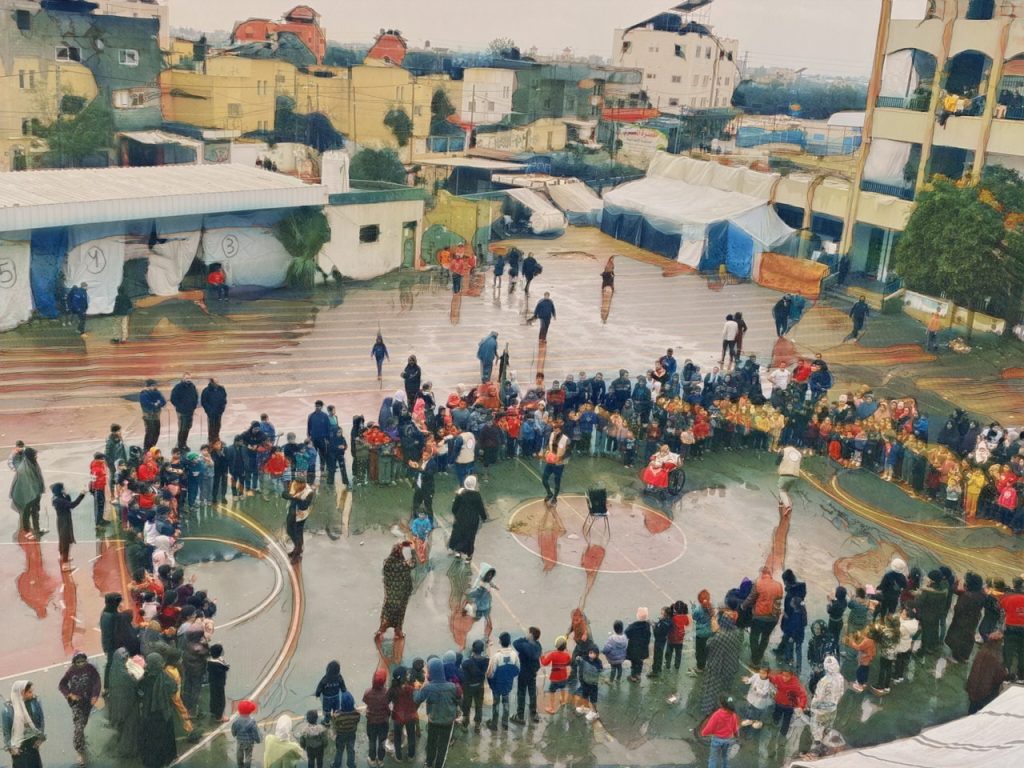
At the beginning of May, the Israeli army dropped leaflets over Rafah and called on the population to leave the east of the city. The United States has threatened to stop the supply of weapons if Israel launches a major ground offensive in Rafah. But Netanyahu has announced that he is willing to advance on his own. His army has closed the border crossing between Gaza and Egypt, including for aid supplies. “People’s hope of leaving for medical treatment has been frozen,” Issam wrote to me at the time.
Undated blog post, May: Today, the tanks are 300 meters away. I imagined we had escaped here, but the scenario of death chases us. I ask myself what sin I committed for all this death to chase us so gruesomely. My friends in Rafah also do not know where to go; many of them are on the streets without shelter. Everyone here has their dreams crushed like bones under the impact of the rockets.
On 26 May, Israeli airstrikes hit a refugee shelter in Rafah, killing dozens and wounding hundreds. Most victims are women and children. Issam, too, has been lightly injured in his arm and leg. His latest message to me is full of grief and anger: “No one can begin to describe what’s happening in Gaza right now. We are dying, dying!! We’re being torn apart. What are you waiting for, cheap world? STOP. THE. GENOCIDE.”






